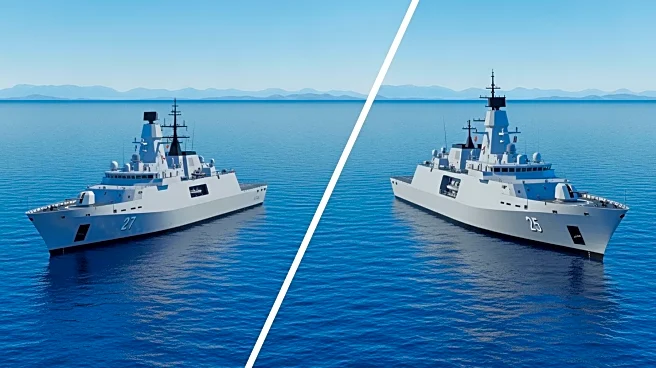What's Happening?
The Philippines and India have conducted their first joint naval exercises in the disputed South China Sea, a move that has raised concerns from China. The exercises involved Indian navy ships, including the guided missile destroyer INS Delhi, and Philippine frigates
BRP Miguel Malvar and BRP Jose Rizal. The drills coincided with Philippine President Ferdinand Marcos's visit to India, where he aims to deepen maritime ties and explore cooperation in defense, pharmaceuticals, and agriculture. Despite being shadowed by Chinese forces, the exercises proceeded without incident, according to Philippine Chief of Staff Romeo Brawner Jr.
Why It's Important?
The joint naval exercises between the Philippines and India are significant as they challenge China's expansive claims in the South China Sea, a vital global trade route. By conducting these exercises, the two countries are asserting their commitment to maritime security and regional stability. This move could encourage other nations to engage in similar partnerships, potentially altering the balance of power in the region. The exercises also highlight the importance of multilateral cooperation in maintaining a rules-based international order, as China has expressed discontent with the involvement of non-regional powers in the South China Sea.
What's Next?
The successful completion of the joint naval exercises sets the stage for further military collaboration between the Philippines and India. Both countries have expressed interest in continuing joint maneuvers, which could lead to more frequent and complex exercises in the future. Additionally, President Marcos's visit to India may result in strengthened bilateral ties and increased cooperation in various sectors. As the Philippines continues to build alliances with other countries, it may face increased pressure from China, which has already expressed discontent with the involvement of non-regional powers in the South China Sea. The situation may lead to heightened diplomatic and military activities in the region.
Beyond the Headlines
The joint naval exercises reflect a broader geopolitical shift in the Indo-Pacific region, where countries are increasingly seeking to counterbalance China's influence. The partnership between the Philippines and India underscores the importance of like-minded nations working together to uphold international maritime law and territorial integrity. This development may encourage other countries to form similar alliances, potentially leading to a more robust security architecture in the region. The exercises also highlight the role of military cooperation in promoting peace and stability, as well as the strategic importance of the South China Sea in global trade and security.















